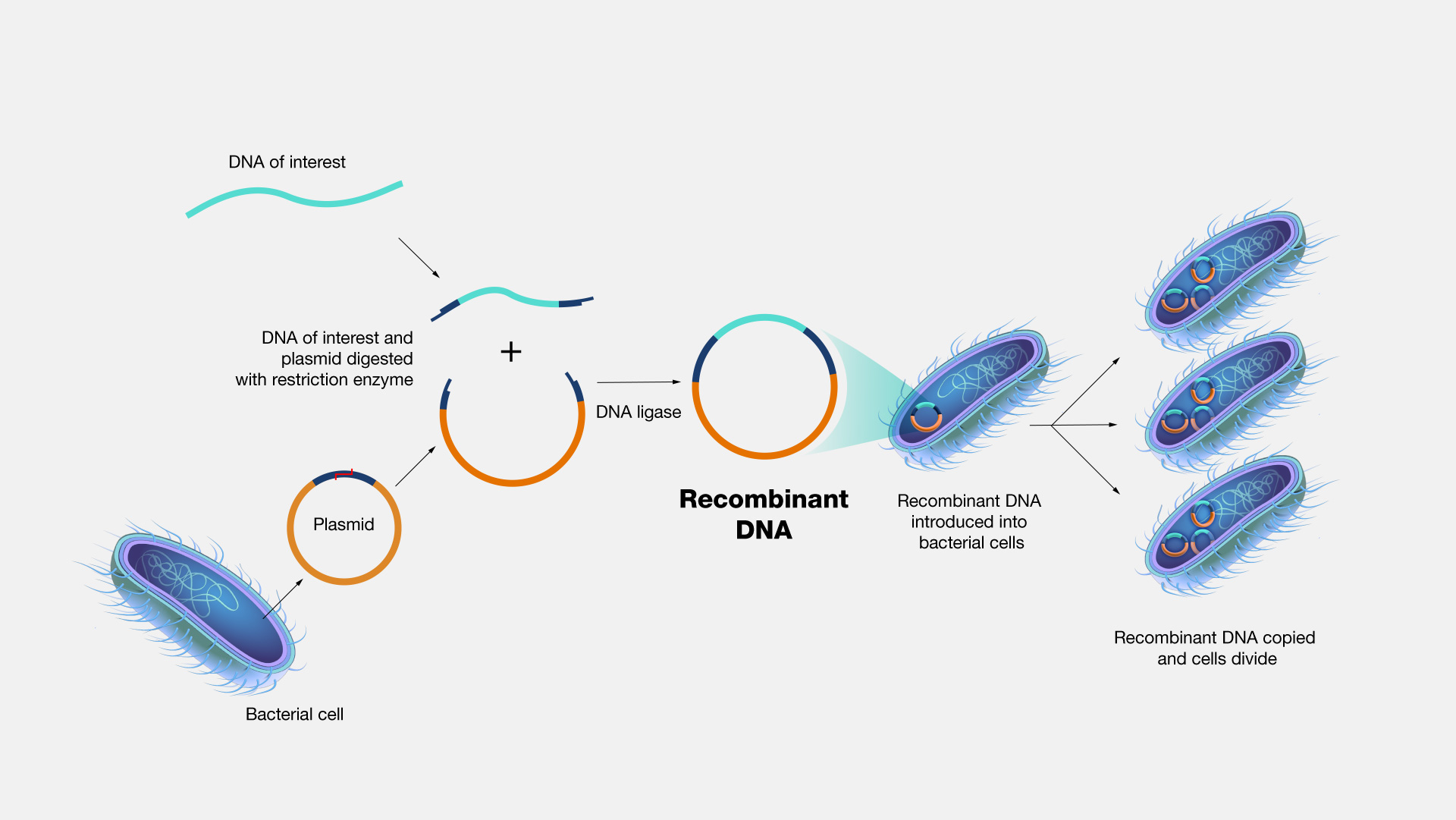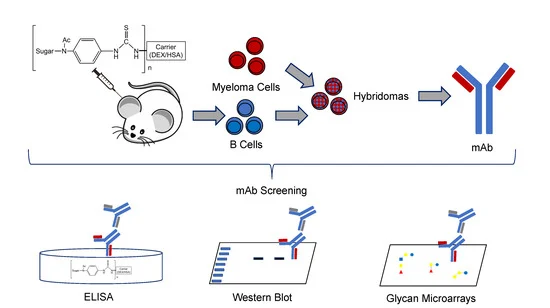Introduction to Antibodies in Research
Antibodies are indispensable tools in biological research and clinical diagnostics. They serve as crucial reagents in various assays, including Western blotting, ELISA, immunohistochemistry, and flow cytometry. The choice between monoclonal and polyclonal antibodies can significantly impact the quality and outcome of experimental results. Understanding the differences between these two types of antibodies is essential for selecting the right tool for your research needs.
Monoclonal Antibodies: Characteristics and Advantages
Monoclonal antibodies (mAbs) are produced by a single clone of B cells that recognize a specific epitope on an antigen. This uniformity in origin results in antibodies that are highly specific for a single target. Here’s a detailed look at their characteristics:
- Production:
- Hybridoma Technology: The most common method for generating monoclonal antibodies involves hybridoma technology, where B cells from an immunized mouse are fused with myeloma cells. The resulting hybrid cells (hybridomas) produce antibodies that are cloned and selected for their ability to bind a specific antigen.
- Recombinant DNA Technology: More recently, monoclonal antibodies can be produced using recombinant DNA technology, which involves inserting genes encoding the antibody into host cells for large-scale production.

- Specificity:
- Single Epitope Recognition: Monoclonal antibodies bind to a single epitope on an antigen. This high specificity reduces cross-reactivity and ensures that only the target antigen is recognized, minimizing background noise and false positives in assays.
- Consistency and Reproducibility:
- Batch-to-Batch Consistency: Monoclonal antibodies offer high consistency across different production batches. This reproducibility is crucial for experiments requiring precise and reliable results.
- Applications:
- Targeted Research: Ideal for applications requiring specific recognition of a single antigen epitope, such as identifying and quantifying specific proteins in complex mixtures.
- Therapeutics: Many therapeutic antibodies used in treatments for cancer, autoimmune diseases, and other conditions are monoclonal due to their targeted action.
- Limitations:
- Production Time and Cost: Producing monoclonal antibodies can be time-consuming and expensive, involving extensive development and quality control processes.
- Limited Epitope Recognition: Since monoclonal antibodies bind to a single epitope, they may not recognize the antigen if it undergoes conformational changes or if the epitope is hidden in a complex context.
Polyclonal Antibodies: Characteristics and Advantages
Polyclonal antibodies (pAbs) are derived from multiple B cell clones, each producing antibodies that recognize different epitopes on the same antigen. This diversity provides a broad range of binding specificities. Here’s a comprehensive overview:
- Production:
- Immunization: Polyclonal antibodies are typically generated by immunizing an animal (e.g., rabbit, goat, sheep) with the antigen of interest. The animal’s immune system produces a mixture of antibodies against various epitopes on the antigen.
- Serum Collection: The antibodies are harvested from the serum of the immunized animal and purified. This process is generally faster and less expensive compared to monoclonal antibody production.
- Specificity:
- Multiple Epitope Recognition: Polyclonal antibodies recognize and bind to multiple epitopes on the same antigen. This broad specificity can enhance the likelihood of detecting the antigen even if some epitopes are occluded or altered.
- Applications:
- General Detection: Useful for applications where recognition of multiple epitopes improves detection, such as in Western blotting, immunohistochemistry, and ELISA.
- High Sensitivity: The presence of multiple antibodies binding to different sites on the antigen can enhance signal detection, making polyclonal antibodies particularly useful for assays with low antigen concentrations.
- Limitations:
- Batch Variability: The composition of polyclonal antibodies can vary between different production batches, leading to inconsistencies in results.
- Cross-Reactivity: Because polyclonal antibodies target multiple epitopes, they may bind to similar antigens or cross-react with other proteins, potentially leading to false positives.
Choosing Between Monoclonal and Polyclonal Antibodies
Selecting the appropriate type of antibody depends on various factors related to the specific requirements of your research:
- Specificity vs. Sensitivity:
- Monoclonal Antibodies: Opt for monoclonal antibodies if your research requires high specificity and you need to detect or quantify a specific epitope with minimal background noise.
- Polyclonal Antibodies: Choose polyclonal antibodies if you need to detect a broader range of epitopes or require higher sensitivity, especially in cases where the antigen is present at low concentrations.
- Experimental Requirements:
- Reproducibility: If reproducibility and consistency are critical, monoclonal antibodies might be preferable due to their uniformity across batches.
- Speed and Cost: For projects with time or budget constraints, polyclonal antibodies might be a better option due to their quicker and less costly production process.
- Nature of the Antigen:
- Well-Characterized Antigens: For well-characterized antigens with defined epitopes, monoclonal antibodies are ideal.
- Complex Antigens: For complex antigens where multiple epitopes are beneficial, polyclonal antibodies can provide better coverage.
Case Studies: Application Examples
- Cancer Research:
- Monoclonal Antibodies: Used to target specific cancer cell markers, such as HER2 in breast cancer, allowing for precise therapeutic interventions.
- Polyclonal Antibodies: Employed in initial screening assays to detect a range of tumor antigens, which can be useful for discovering new biomarkers.
- Infectious Disease:
- Monoclonal Antibodies: Developed to target specific pathogens or toxins, such as in the case of COVID-19 neutralizing antibodies.
- Polyclonal Antibodies: Utilized for broad-spectrum detection of bacterial or viral infections where multiple antigens are present.
- Neuroscience:
- Monoclonal Antibodies: Applied to study specific neurotransmitter receptors or neuronal markers with high specificity.
- Polyclonal Antibodies: Used to identify a broader range of neuronal proteins or for general immunostaining of brain tissues.
Both monoclonal and polyclonal antibodies have their unique advantages and limitations. Monoclonal antibodies offer high specificity and reproducibility, making them ideal for targeted research and therapeutic applications. In contrast, polyclonal antibodies provide broader epitope recognition and higher sensitivity, making them suitable for a variety of assays and detection methods. The choice between monoclonal and polyclonal antibodies should be guided by the specific requirements of your research, including the nature of the antigen, the need for specificity versus sensitivity, and considerations of cost and production time.
